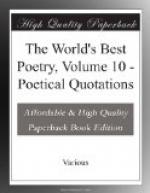[Bartlett quotes, in this connection, the following:]
“Some prophet of that day said:
’The Avon to the Severn
runs,
The Severn to
the sea;
And Wickliffe’s dust
shall spread abroad,
Wide as the waters
be.’”
From Address before the “Sons of New Hampshire”
(1849). D. WEBSTER.
JOHN MILTON.
Nor second he, that rode sublime
Upon the seraph-wings of ecstasy,
The secrets of the abyss to spy.
He passed the flaming bounds
of place and time,
The living throne, the sapphire blaze,
Where angels tremble while they gaze,
He saw; but, blasted with excess of light,
Closed his eyes in endless night.
Progress of Poesy. T. GRAY.
OLIVER CROMWELL.
His grandeur he derived from Heaven alone;
For he was great, ere fortune
made him so:
And wars, like mists that rise against
the sun,
Made him but greater seem,
not greater grow.
Oliver Cromwell. J. DRYDEN.
Or, ravished with the whistling of a name,
See Cromwell, damned to everlasting fame!
Essay on Man, Epistle IV. A. POPE.
KING CHARLES II.
Here lies our sovereign lord the king,
Whose word no man relies on;
He never says a foolish thing,
Nor ever does a wise one.
Written on the Bedchamber Door of Charles II.
EARL OF ROCHESTER.
MARTIN LUTHER.
The solitary monk who shook the world
From pagan slumber, when the gospel trump
Thundered its challenge from his dauntless
lips
In peals of truth.
Luther. R. MONTGOMERY.
THOMAS CHATTERTON.
I thought of Chatterton, the marvellous
Boy,
The sleepless soul that perished in his
pride.
Resolution and Independence. W. WORDSWORTH.
JAMES THOMSON.
A bard here dwelt, more fat than bard
beseems,
Who, void of envy, guile, and lust of
gain,
On virtue still, and Nature’s pleasing
themes,
Poured forth his unpremeditated strain:
The world forsaking with a calm disdain,
Here laughed he careless in his easy seat;
Here quaffed, encircled with the joyous
train,
Oft moralizing sage: his ditty sweet
He lothed much to write, he cared to repeat.
Stanza introduced into Thomson’s “Castle
of Indolence,” Canto I. LORD LYTTELTON.
In yonder grave a Druid lies.
Where slowly winds the stealing
wave;
The year’s best sweets shall duteous
rise
To deck its poet’s sylvan
grave.
Ode on the Death of Thomson. W. COLLINS.
WILLIAM HOGARTH.
The hand of him here torpid lies
That drew the essential form
of grace;
Here closed in death the attentive eyes
That saw the manners in the
face.
Epitaph. DR. S. JOHNSON.




